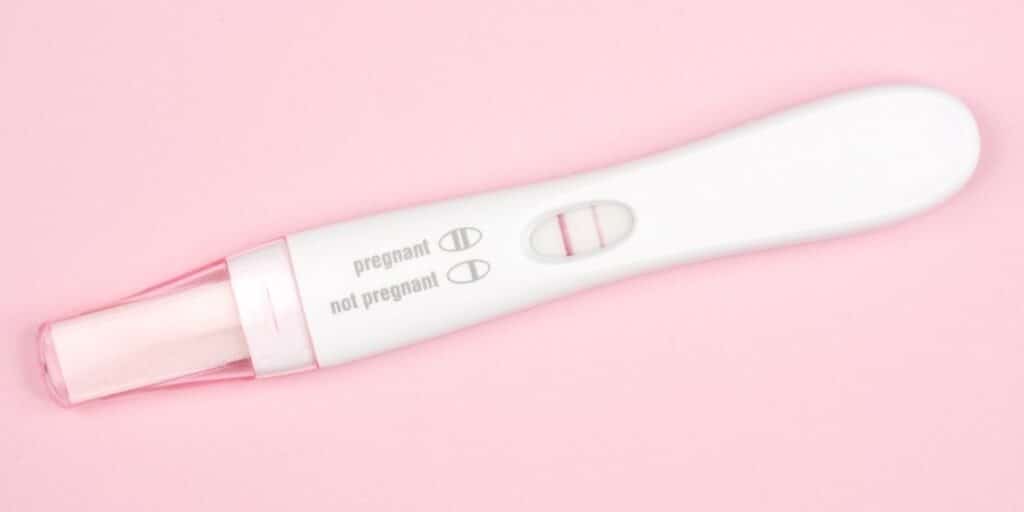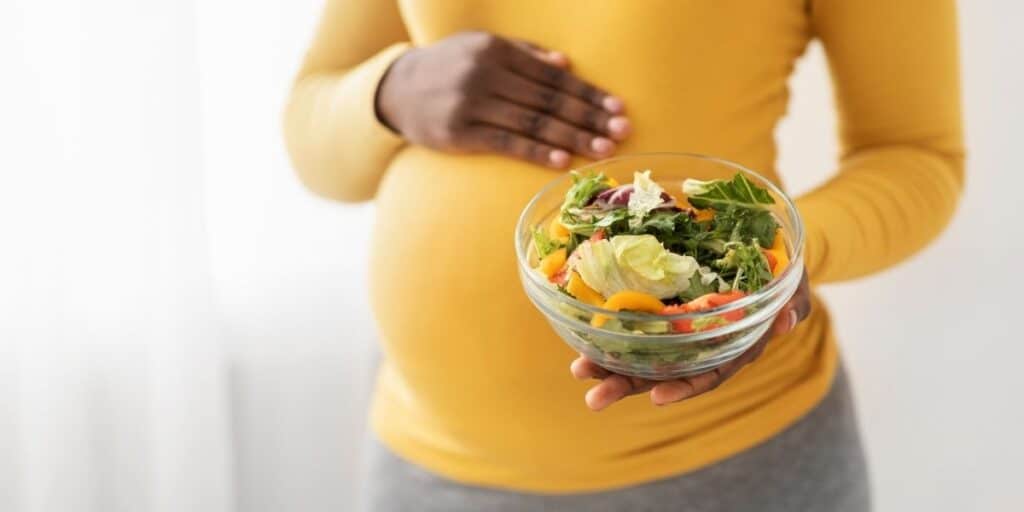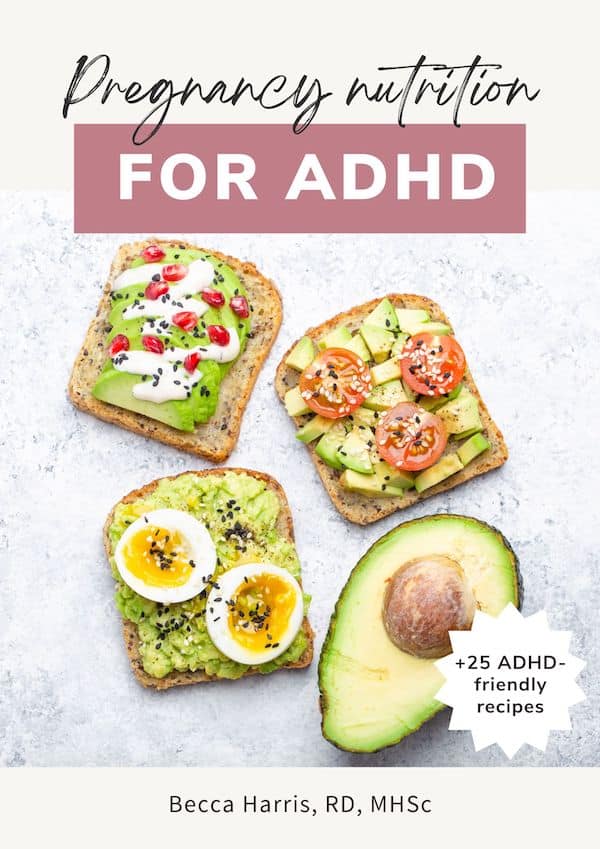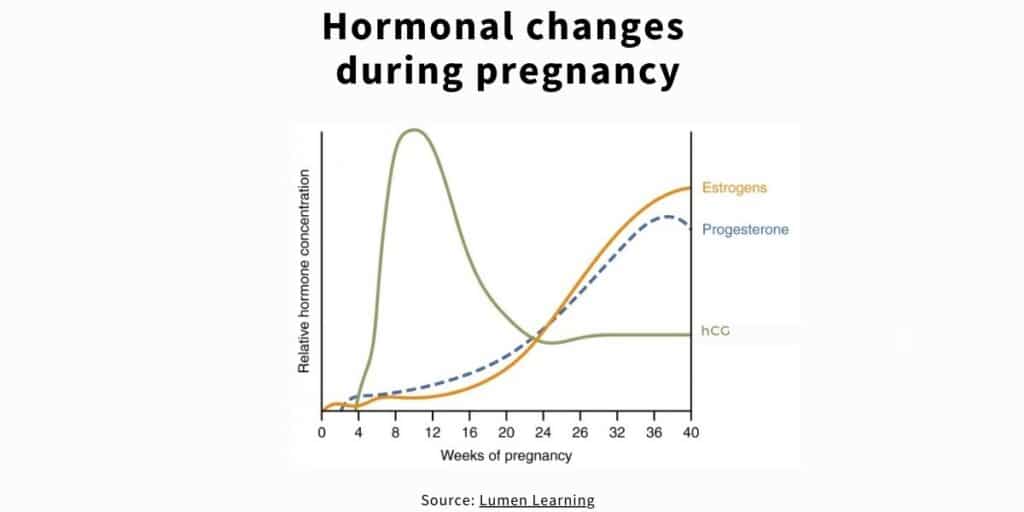This blog post will help expectant mothers navigate ADHD and pregnancy. It covers some of the ways that pregnancy is different for ADHDers, research on ADHD medication during pregnancy, and what to expect by trimester.
If you buy from one of the links in this post, I may earn a commission. Visit my Privacy Policy for more information on affiliates.
If you’re reading this, you might be pregnant or thinking about growing your family. Even if you are just curious to learn more about being pregnant with attention deficit hyperactivity disorder (ADHD), welcome!
This article pulls from current research as well as my own personal experience when I was pregnant with ADHD.
I am writing this article with my newborn baby on my chest and am living proof that you too can do this.
Please consult the appropriate healthcare professionals before implementing ANY change to your diet or ADHD treatment plan.
Are you interested in learning more about nutrition during pregnancy? I’m a Registered Dietitian and I have an ebook that covers everything you need to know about prenatal nutrition for ADHD.
At the end of this article you’ll find a $10 off promo code.

Pregnancy with ADHD
Pregnancy in general can be a rollercoaster of symptoms, emotions, and changes.
Add a neurodevelopmental disorder and untreated ADHD symptoms and it can feel like that rollercoaster is falling off the tracks.
Pregnancy can be different for those with ADHD when you factor in the impact of hormonal fluctuations on symptoms, the possible adjustments needed in ADHD medications, and the pressures of staying on top of hydration, meals, and prenatal supplements.
Pregnancy hormones
While research is lacking in this area, there are things we know about hormones and how they change and impact those who become pregnant.
All pregnant women and those assigned female at birth (AFAB) are affected differently by pregnancy. And those with ADHD may experience some unique challenges during this time.
The most likely cause: hormones.
During pregnancy, you will experience a fluctuation of hormones that can worsen (or improve) certain ADHD symptoms. These may contribute to fluctuations in focus, fatigue, regulating emotions, impulsivity, and executive function.
hCG
In the first few weeks of pregnancy there is a surge in human chorionic gonadotropin (hCG), which is the hormone that triggers your body to create more estrogen and progesterone.
hCG is also the hormone that is detected in a home pregnancy test.
hCG is linked to some of the typical first trimester symptoms like brain fog, fatigue, mood swings, breast tenderness, light-headedness, and possibly morning sickness (although the verdict is still out on this one).
Progesterone
As pregnancy progresses, the levels of estrogen and progesterone in the body increase. Progesterone supports your uterus and immune system.
It may also contribute to lower blood pressure and dizziness, as well as pregnancy symptoms like nausea, heartburn, and constipation.
Estrogen
Estrogen supports the development of the baby and the functioning of the placenta.
There are currently no studies that look at the link between increased estrogen during pregnancy and improved ADHD symptoms. However, estrogen has been shown to increase dopamine synthesis and receptor sensitivity, and decrease the rate at which dopamine is broken down.
Dopamine is considered to be the primary neurotransmitter behind ADHD symptoms. It plays a role in attention regulation, motivation, emotional response, and the internal pleasure and rewards systems.
Issues with dopamine processing often push ADHDers to look to their environment for pleasure and reward. This results in some of the typical externalized symptoms of ADHD, including inattention and hyperactivity.
So, an increase in estrogen may have a positive impact on ADHD symptoms. And many pregnant people actually report improvements in symptoms in the second and third trimesters.
How is pregnancy different for someone with ADHD?
There are some significant differences in how a pregnancy can impact someone with ADHD. These are often linked to the fluctuations in hormones just mentioned.

Executive dysfunction.
Executive dysfunction is when someone experiences challenges with regulation, organization, or both.
Regulation challenges might involve one’s ability to make decisions, control impulses, or manage their time. Organization challenges might involve paying attention or planning.
Executive dysfunction is something commonly experienced in those with ADHD. However, pregnant people with ADHD may find it more difficult to stay on top of tasks and responsibilities, especially those that come with pregnancy.
These might include keeping track of appointments, prenatal vitamins, and preparing for the baby’s arrival.
Find strategies and tools that work for you in order to stay on top of things. Some of my favorite ADHD pregnancy tools are listed in my ebook.
This is also the time to let go of plans, activities, and responsibilities that are not currently serving you.
Hyperactivity.
Hyperactivity might make it challenging for you to slow down your body and/or your mind. Racing thoughts and the inability to sit still may intensify the normal stresses of pregnancy.
Physical activity can be really helpful here…as long as your healthcare providers have given you the go-ahead.
Fatigue.
Pregnancy can be exhausting, and people with ADHD may find it particularly difficult to manage their energy levels.
ADHD symptoms can also be more pronounced when a person is tired, which can compound the challenges of pregnancy.
Check in with your body and rest when you need to. Your tank can’t run on empty.
Lower interoceptive awareness.
Many people with ADHD experience lower interoceptive awareness. Interoceptive awareness is the perception and acknowledgement of your body’s signals.
Having lower interoceptive awareness means that ADHDers may not feel internal body cues the way that others do.
Low interoceptive awareness can impact a pregnant person in a variety of ways since they may not acknowledge signals, like:
- Hunger
- Thirst
- Fatigue
- Overwhelm
- Bathroom needs
- Baby movement
- Pain or other body sensations, like Braxton Hix contractions
If you experience lower interoceptive awareness, it is still important to prioritize self care. Getting enough sleep and eating a balanced diet is beneficial to both you and your baby.
Taking care of yourself can also help manage stress levels throughout your pregnancy.
Set alarms to check in with yourself and schedule meal times if you need.
Your body will be feeling a lot of new sensations. Listening and responding to them is important to a healthy pregnancy.
ADHD medications during pregnancy
Can you still take Adderall, Vyvanse, or other ADHD medication while pregnant? Are there any adverse effects?
Stimulant or non-stimulant medication may be important to your ADHD treatment plan. It can help improve ADHD symptoms, stress, and other mental health outcomes.
Unfortunately, the research on the effects of ADHD medication during pregnancy is very limited. However, a few smaller studies have shown an increased risk for certain pregnancy outcomes.
Let me be clear: I am NOT a doctor – I am a dietitian. The following are some research findings on ADHD meds during pregnancy.
One population-based cohort study in the United States showed that the use of stimulant medications during pregnancy may increase the risk of preeclampsia (high blood pressure during pregnancy) or having a preterm birth (a baby born before 37 weeks).
Another study (which has been criticized for its small sample size) found that ADHD medication throughout early pregnancy may have a small elevation of risk for certain birth defects such as gastroschisis, omphalocele, and transverse limb deficiency.
While these are absolutely things to keep in mind when deciding whether or not to stay on your medication, the known risk for any of these complications is small.
There simply has not been enough research done on the effects of stimulant or non-stimulant medications to say that there is a safe option…yet.

The good news: a recent study showed that taking ADHD medication during pregnancy does not increase the baby’s risk of developing a neurodevelopmental disorder. (But of course, there are also genetic factors at play here)!
Taking ADHD medicine during pregnancy is a personal choice, so work with your health care provider to find what works best for you. In many cases, the potential benefits of staying on the medication may outweigh the potential risks.
So, if you find your ADHD symptoms difficult to manage without medication, your general practitioner can help guide you to create a treatment plan for your pregnancy.
With that being said, it’s estimated that 1 in 200 mothers continue to take their ADHD medication throughout pregnancy.
What if I stop taking adderall, vyvanse or other ADHD medications during pregnancy?
You may also choose to forego your ADHD medication. If this is the path you chose, just know that going off of it can be tough at first.
An increase in ADHD symptoms is likely, as well as some side effects. These might include anxiety, irritability, panic attacks, issues sleeping, depressive thoughts, fatigue, or intense hunger.
Check with your healthcare provider as they may suggest that you slowly wean off the medication rather than stop “cold turkey”.
So, how else do you manage ADHD during pregnancy?
Your provider may also suggest some non-medicinal treatment options like cognitive behavioral therapy and lifestyle modifications including getting adequate nutrition, sleep, and engaging in physical activity.

I recommend working 1-on-1 with a Registered Dietitian if eating becomes a stressor throughout this process.
Some stimulant medications can curb your appetite, so stopping them may initially have the opposite effect on your hunger cues. This may be triggering if you have a history of disordered eating.
If withdrawal symptoms are intense or last longer than a few days, contact your healthcare provider.
What to expect by trimester
In addition to ADHD symptoms, here are a few of the most common pregnancy symptoms to expect by trimester.
First trimester
- Cravings and aversions
- Morning sickness
- Mood swings
- Heightened sense of smell
- Breast tenderness
- Fatigue
Second trimester
- Increased energy levels
- Increased appetite
- Round ligament pain
- Skin changes, including darkening of the nipples and stretch marks
- Growth of uterus and abdomen
- Baby movement
Third trimester
- Rapid growth of uterus and abdomen
- Braxton Hicks contractions
- Edema (swollen limbs)
- Shortness of breath
- Difficulty sleeping
- Leaking from breasts
- Frequent urination
- Constipation
- More baby movement
- And we can’t forget…birth!
Prenatal nutrition
Ok, now let’s talk about nutrition!
Nutrition is arguably one of the most powerful tools at your disposal during pregnancy.
It plays a critical role in supporting a healthy pregnancy by helping you grow your baby, improving birth outcomes, and reducing pregnancy symptoms, like the ones mentioned above.
It can also help you manage your ADHD symptoms in the process.
How ADHD can impact prenatal nutrition
- Forgetting to eat
- Lower motivation to cook
- Overwhelmed by kitchen tasks
- Executive dysfunction
- Food boredom
- Ignoring hunger cues
- Eating for stimulation
- Binge eating
If you struggle with binge eating, it is important to work with your healthcare provider and a Registered Dietitian during this time.
Increased and consistent caloric intake during pregnancy is a biological requirement. Engaging in the binge-restrict cycle can impact the overall health of your pregnancy and baby.
How adequate prenatal nutrition can impact ADHD
- More energy
- Improved focus
- Less jittery
- Less irritable
- Fewer headaches
- Stimulation
- Less likely to binge eat
- Improved ADHD and pregnancy symptoms
- Healthy baby
I discuss strategies for optimizing nutrition in my ebook. But remember – you know yourself better than anyone else.
Do what works for you, whether that’s meal planning, resorting to paper plates instead of washing dishes, or using meal kits and convenience foods to stay nourished.
Check out my article on the ADHD Diet if you’re interested in learning more about the link between ADHD and food in general!
Bottom line
- Pregnancy can be different for those with ADHD when you factor in the impact of hormonal fluctuations on symptoms, the possible adjustments needed in ADHD medications, and the pressures of staying on top of hydration, meals, and prenatal vitamins
- Having ADHD during pregnancy may impact executive dysfunction, hyperactivity, fatigue and/or interoceptive awareness
- Increased estrogen can improve dopamine processing. And while there is currently no research on how the hormone impacts ADHD symptoms during pregnancy, many pregnant people report improvements in symptoms in the second and third trimesters
- More research is needed on how pregnancy impacts those with ADHD and the positive or negative effects of medication during pregnancy
- ADHD medication use, as well as the use of other prescription medications should be discussed with your healthcare provider
- Maternal nutrition can help improve symptoms and birth outcomes for your baby
Want more information on pregnancy nutrition for ADHD?
It was created to help expecting ADHDers meet their nutrition needs and feel good during pregnancy.

In reading the ebook, you’ll learn how to…
- Identify more ways pregnancy can impact ADHD
- Implement ADHD-friendly tools and strategies that can help
- Feel confident about what you are eating throughout each trimester
- Make a balanced plate that supports pregnancy
- Identify high-risk foods and use food safety techniques
- Manage pregnancy symptoms using nutrition
Plus it includes 25 ADHD-friendly recipes that will help you meet your prenatal nutrition needs!
Use the promo code BLOGDISCOUNT for $10 off the ebook.
If you would like 1-on-1 nutrition guidance please work with a Registered pregnancy Nutritionist/Dietitian in your area.
Adding children to your family is no easy feat. But it is also one of the most rewarding adventures. Someone once told me that their ADHD helped them be a more curious and adventurous parent, and I absolutely loved that!
Let me know what you thought of this article about ADHD during pregnancy in the comments below.







